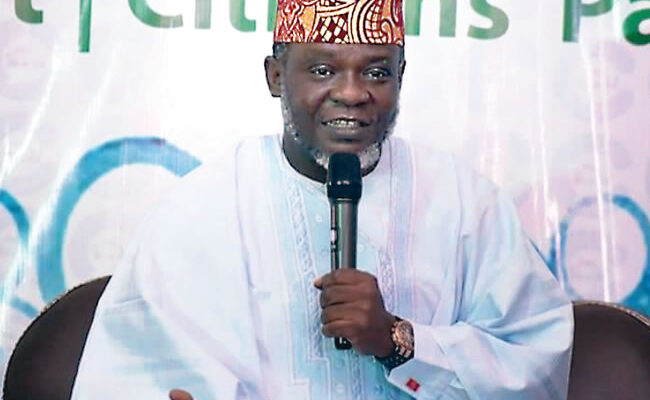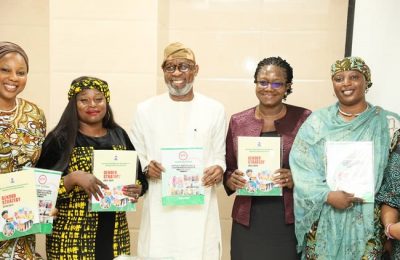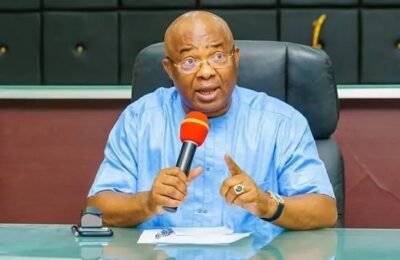

With the backlash that followed the 2022 protracted ASUU strike, Chief Ezenwa Nwagwu, a civil society activist, in this interview with CHRISTIAN APPOLOS, x-rays the origin of incessant strikes in Nigeria’s tertiary education sector, the consequences to public education, and what government must do differently to change the trend.
What are your comments on the protracted strike that rocked Nigeria’s tertiary education sector in 2022?

First, we need to background the strike issue so that we can understand how we got to 2022. The IMF and the World Bank long ago asked our government to stop funding public education, and it agreed. It has been a struggle between government and trade unions in the education sector since then. That struggle is what has affected public education. So, the trade unions in tertiary education are fighting to ensure that the government continues to invest in public education.
The current struggle started in 1992 when Attahiru Jega was the president of ASUU. The union embarked on a six-month long strike, demanding a six billion stabilisation fund. At that time, the government said it didn’t have six billion. So it entered into an agreement with the union and made promises. And as always, it reneged.
Every strike you have seen from that time is in line with the same issue. Since 1992 till now, we have had close to 40 strikes by the Academic Staff Union of Universities, all demanding that agreements, simple agreements that the government entered into, should be honoured. Whether it is in 2009, 2013, it is all a renegotiated strike.

In 2014, the Federal Government set up a committee headed by the current INEC chairman to look into the challenges of public universities in Nigeria, and the committee toured the country and produced a report. The report said that the condition of public tertiary universities in Nigeria is nothing to write home about. We are talking about classrooms, laboratories, hostels, etc. Till date, the government has not reasonably implemented the recommendations of that committee. So going by this, these strikes should not be called ASUU strike; it should rather be called Federal Government-induced strike.

In 2022 ASUU wrote more than 10 letters asking the Federal Government to renegotiate an agreement it entered with them. But there was no response or reply to any of those letters until ASUU decided to give what was called the warning strike. The warning strike was ignored until we now had a five-month strike that everyone is talking about. The impact is that the condition that was bad before has degenerated to the worst.
The continued Federal Government-induced lockdown of the universities, collaborating with the IMF and the World Bank has worsened the crisis in the entire tertiary education sector in Nigeria. Now you have universities rushing to complete a backlog of academic sessions and they are rushing the children with assignments, tests and examinations back-to-back.
Are you saying that the Federal Government is solely responsible for the incessant strikes in Nigeria’s tertiary education?
I am backtracking the issues of the strikes in Nigeria’s tertiary education so that you don’t just situate it on the last strike. Since 1999, ASUU and other unions have embarked on strike. And it is simply about honouring agreements reached with the government. There are no new issues. So, it is not out of place to say that the government is responsible for the strikes.
The point is that university lecturers are demanding improved conditions for learning in public universities. Judging by this simple truth, in what way can you say they are committing any wrongdoing? What they are saying is fund your universities so that the children of the poor and middle class can have education. And the government is obviously saying no because the World Bank is telling it not to fund public education, that it should rather allow private enterprise (universities).
Now we have more private universities mushrooming. Unfortunately, most of those private universities are owned by the same people in government using different kinds of fronts. Just a few of them like Obasanjo and Atiku are bold enough to show that they are the owners of private universities because those ones believe that nothing can happen to them. Whereas we have more and more private universities mushrooming everyday in the country, the government is showing less interest in funding public education.
When people say ‘ASUU strike’, they are trying to give an impression that ASUU is cantankerous, always wanting to cause trouble; but the truth is that ASUU and the other unions are doing a patriotic duty. It is a patriotic duty to ensure that public universities do not die in Nigeria. So if you remove the unions as we speak today, nobody will be in any public university because the idea is to make sure that the Bells University of this world, American University of this world, Covenant University, Igbinedion University and their likes become the centres of attraction for university education in Nigeria for the rich.
What then will happen to the children of the poor who cannot pay the millions of Naira charged for fees in the private universitie? A vice chancellor, in a recent discussion, explained how difficult it is for some parents to pay the N25,000 acceptance fee that their children are asked to pay.
So, beyond the challenges of the crisis of poverty and unemployment and the rest of them, you also now want to have elite universities that the children of the poor cannot afford to attend. If such is what should be, what then is the value and reason to have a government?
Should the government succeed in not funding public education in Nigeria, are the private universities enough to cater for the education needs of Nigeria?
It is practically impossible. The challenge is that Nigeria’s population is on the increase. People needing education are increasing. So when you are glamourising entrepreneurship and asking people to go and learn shoe making, tailoring and have skills but your own children are in those private universities learning how to administer a country where you have shoe makers, what kind of country would Nigeria then be? That is the ideological part the government needs to see.
The idea of not funding public education is to systematically shut out the majority of your citizens from education. If you listen to government people, they are always talking about skill acquisition, but when you sit down to think, you ask; where are their own children? Their children are in MIT, Harvard University and Canadian universities not learning shoemaking or tailoring but aeronautical engineering, medicine, public administration so that they can transfer to their own children the position of governance. That is the challenge. It is an ideological construct.
Education is the bedrock for a nation’s development. Is the government not working against the development of Nigeria if not funding public education is its agenda?
The Nigerian political elite are a group of people subverting itself. They apparently work against Nigeria’s enlightened self-interest. By wanting to raise citizens who are uneducated, who they think by being uneducated they can manipulate, they are unfortunately working against the country. If Nigeria has more uneducated people, what gain will they offer to the country?
Like I earlier said, the idea of a university education is not to create jobs but to produce citizens who have the ability for critical thinking and innovation. If you allow people not to get education, the predominant ideology is that they can be easily manipulated.
So, it is the elite that subvert Nigeria’s success, and even against the country’s development and security, because the more uneducated people you have, your children whom you are educating abroad and in private schools will not be able to lead and govern the country you are planning to hand over to them. As seen today, the same uneducated people will make life and the country very ungovernable for everybody. That is virtually what we are seeing with the whole issue about banditry, Boko haram, unknown gunmen.
If you educate your citizens, if you engage them in meaningful self-esteeming jobs, not the recharge cards economy that we are running, it will be difficult for banditry, Boko Haram, unknown gunmen and the rest to fertilise and grow.
Can a practising journalist leave journalism and now say that what is best for him or her is to go inside the bush to be shooting people in the name of banditry or what have you? It is not possible because that person has education.
Many of these people that are engaging in these vices that fuel insecurity are frustrated, angry and are manipulated by the educated to fight a cause they know nothing about and don’t even understand in most cases. We are facing a multifaceted challenge and it must be placed squarely on the doorstep of an absentee government, absentee government in the life and things that matter to the generality of its population.
Judging by this trend, is the hope for a better educated and safer Nigeria a mere dream?
Well, we are doing what we are doing even with this press interview because we are positive about our country and we also believe in our country.
But we must raise citizens who are able to challenge obscurantism. Every form of obscurantism should be challenged. Take for instance, in the last 40 years of our country, the government has stopped funding public hospitals. The ones we were able to build with our common patrimony, they have sold them to private people. If you go to any public hospital now, you start paying from the entrance because the government has concessioned all of them out.
So what we need to understand is the ideology of the ruling class and begin to challenge them meter by meter, space by space, and hold them accountable. We need to get away from this syndrome of ‘it is my turn.’ We need to challenge people on the basis of what they present and represent for the ordinary people of this country. Now we are lucky that all the contestants in the 2023 presidential election have antecedents that we can look at and interrogate and x-ray around their interventions that have uplifted or contributed to the destruction of the wellbeing of the general population of Nigeria and not the ones that benefited few people.
The labour unions are most often seen as self-interest pursuant people, what is your take on that?
They exist to defend the welfare interests of their members and working conditions. Any trade union that cannot resist bad policy is a bureaucracy. It is not a trade union, but rather a civil service. The civil service does not challenge any government policy. But trade unions are rated based on their ability to defend the interest of their members and are not worth calling a trade union if they cannot defend the interest of their members.
And they are the most patriotic organisation that exists currently in Nigeria and have no match in terms of the defence of the interest of the Nigerian people especially in the area of the investment and funding of public education.
What is your judgement on the government’s attitude to the issues that led to these strikes?
Government attitude is, simply put, irresponsible. The only way to summarise it as far as the issues of funding of public education and management of labour relations is concerned, is that the government is irresponsible and dishonourable.
What should the government do differently to avoid a repeat of strikes in 2023?
Government needs to be proactive. Proactive engagement with the labour unions will help better the situation. I don’t see why you should enter an agreement and wait until the tenure of the agreements elapses, wait till the union you entered agreement with writes to you, you also linger in deciding whether you respond or not, until they call for strike.
If you entered an agreement and that agreement is ending in 2022, by August of 2022 if you are not able to fulfil the conditions of the agreement, you write the union. You are the one to write the unions and say based on so and so we are not able to meet our obligations, is it possible for you to come for a conversation?
There will not be any strike if the government is proactive because for the unions it is not about winning; it is about mutual respect. Respect to agreements and MOUs. When the government proactively respects its own agreements, it will reduce the issues that lead to industrial action.
Beyond that, having set up committees, the government should begin to look at the reports of those committees it set up and begin to see what it needs to do for funding, classroom renovation, for hostels and for research and grants.
What must labour unions do to be more formidable and attract the respect of Nigerians and the government?
Labour unions must continue to improve their capacity to understand the times and evolve innovative ways of engaging, in a way that produces results because strikes are not the end, they are means. The end is what you got for your members after your strike.
ALSO READ FROM NIGERIAN TRIBUNE









